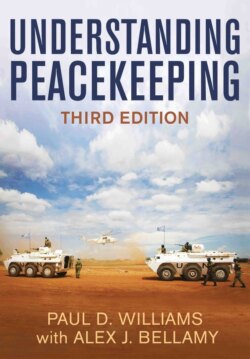Читать книгу Understanding Peacekeeping - Alex J. Bellamy - Страница 46
Conclusion
ОглавлениеThe genesis of modern peace operations is intimately connected to three big ideas. The first is that the great powers have a special responsibility to maintain international peace and security because they have a vested interest in preserving the international order in which they occupy a privileged position. This produced the ‘legalized hierarchy’ (Simpson 2004) that was evident across the Concert of Europe, the League of Nations and the UN Security Council. In the realm of peace and security, international organization depends on the world’s most powerful states having a vested interest in preserving the status quo or managing orderly reform. The UN’s architects sought to achieve this by creating permanent members of the Security Council with veto powers. While critics of the veto complain it arbitrarily privileges the five victorious states in the Second World War and prevented the UN from operating effectively during the Cold War, the system has important merits. As Roberts and Kingsbury (2000: 41) point out, the veto system is superior to the League’s decision-making procedures in several ways: it helped to get and keep the great powers within the UN framework; it may have saved the UN both from damaging conflicts with the great powers and from entangling itself in impossible and divisive operations; it has encouraged the habit of consultation between the P5 states; and it reduces the risk of major discrepancies between power politics and the law of the UN Charter.
The second big idea in the evolution of peace operations was collective security. Specifically, peace operations were based on the idea that wars between and within states were rightly the subject of international concern and could be ameliorated by collective action. The League of Nations and the UN both developed peace operations because they were unable to pursue the form of collective security envisaged by the architects of the League’s Covenant and UN Charter. Moreover, with the decline in the number of interstate wars and the relative increase of intra-state armed conflicts during the Cold War, the traditional model of collective security became less and less appropriate for addressing the whole range of challenges to international peace and security.
Third, although muted by Cold War politics and less salient than the first two ideas, the history of international organization and the evolution of early peace operations after 1945 were both influenced by the growing significance accorded to humanitarian concerns. It is often overlooked that some of the UN’s earliest operations (e.g. ONUC and UNFICYP) were tasked with protecting and promoting human rights (Månsson 2005). As the next two chapters demonstrate, this was to become a central challenge facing peacekeepers during the 1990s and beyond.
